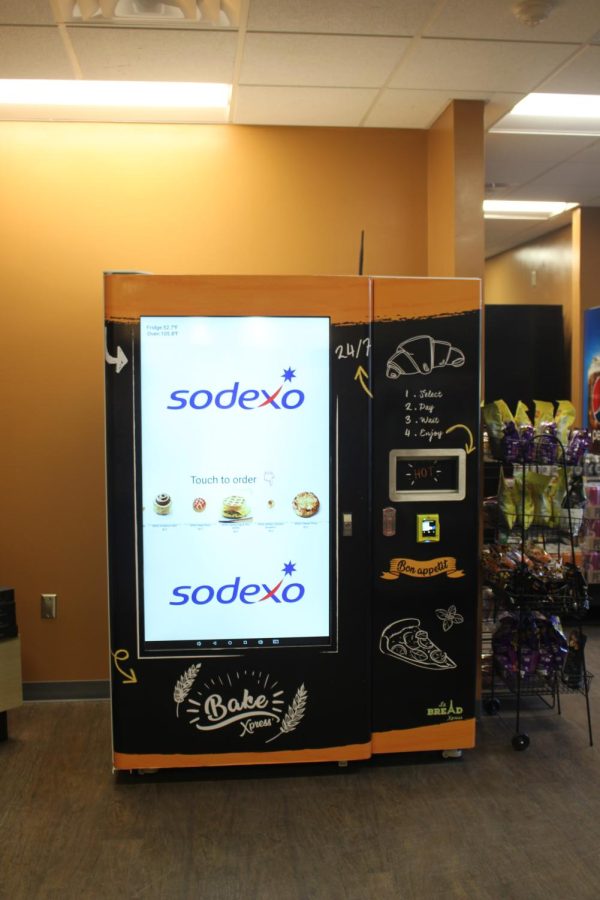Sodexo to offer free flex for students after rough ride statewide
One of the new hot food vending machines in Hanson Hall was installed earlier this month. The vending machine offer warmed up cinnamon rolls, breakfast sandwiches, pizza and chicken.
October 18, 2022
Students at South Dakota’s six regental universities will receive additional money in their meal plans and other free offers from Sodexo after a shaky transition onto campuses across the state.
“[Sodexo] is owning the experience and saying, ‘hey, we understand that this isn’t where we expected it to be, and we wanted to make a gesture to students to apologize for the inconvenience,” said Douglas Wermedal, vice president of student affairs at SDSU.
The decision to give students flex money and other offers was discussed at the Board of Regents meeting Oct. 6 at Dakota State University in Madison, according to Blake Pulse, SDSU’s Students’ Association president and University Food Service Advisory Committee chair.
Damien Lewis, Sodexo’s general manager at SDSU, said that while his company has not decided how much money they will offer students, the company is committed to making things right.
“It’s a goodwill gesture toward the students of the South Dakota system,” Lewis said.
At SDSU, Sodexo has come under fire for offering limited dining hours, the lack of mobile ordering, vacant locations and a delayed rollout for Starship food delivery robots — problems Pulse and Wermedal say Sodexo is making significant headway in.
“The transition in the last two weeks has gotten drastically better,” Pulse said, adding that Starship food delivery robots will serve more locations by the end of October. Currently, the robots deliver for Slices Pizza, with Erbert and Gerbert’s and Union Coffee next on the schedule.
Hot food vending machines are now available in Hansen Hall, and mobile ordering is now available for Shorty’s Hotbox and Union Coffee, and will soon be available for Slices and Grille, according to Lewis.
Additonally, a salad bar is planned for The Market and will be available in the next few weeks.
Last spring, the regents selected Sodexo to hold the statewide contract for all six regental universities. Prior to the transition, Aramark had served as SDSU’s vendor for over 20 years.
South Dakota School of Mines and Technology, the BOR campus with the most difficult transition, is still recovering from its rough start with Sodexo. Cody Marshall, the Students’ Association president for SDSMT, said while the situation is improving, there’s still a lot of work to be done.
“We only have our main dining hall and then we have Einstein Bros. Bagels with Caribou Coffee,” Marshall said. “We’re supposed to have a 24-hour C-Store that hasn’t opened yet that’s supposed to be all self-serve. There’s supposed to be a grill … Miner Shack wasn’t even open for the first week or two of school, so the only places you could go on campus were Einstein’s — which was packed with 30 minute lines — or the dining hall.”
During the first weeks of the semester, the main dining hall was running out of food some nights during the dinner rush, leaving students waiting for over half an hour before food could be restocked, according to Marshall.
“The first week of service, only one hot entree option was available,” Marshall said. “Second week of service, only two hot entree options were available.”
Marshall also confirmed students are still using disposable dinnerware in the dining hall since Sodexo hasn’t received its order of dinnerware to replace the stock the last vendor, Aramark, owned (and left with) when Sodexo took over operations.
Additionally, hot food vending machines Sodexo ordered to increase instant options at SDSMT are stranded on cargo ships in the Pacific.
The problems experienced at SDSMT early in the semester led to a management shake-up. While Marshall is optimistic about the situation improving, he isn’t satisfied with Sodexo’s flex money offer.
“The biggest frustration with [the offer of flex money] is where do you spend it?” Marshall said. “Do you spend it at the Miner’s Shack that closes at 3 p.m. or do you go buy Einstein’s for the fifth time in the week?”
DSU was the only campus in the system contracted with Sodexo at the time of the transition. Amy Crissinger, DSU’s vice president for student affairs and enrollment management, said DSU is not immune to problems other campuses are experiencing.
“We aren’t having the big [problems],” Crissinger said, but listed increased catering costs, supply chain issues, a still-shuttered Starbucks and delayed renovations for campus dining locations as some of the setbacks Sodexo is working through.
Wermedal identified the biggest factors for the setbacks and less-than-optimal operating hours, noting the labor shortage as the most impactful problem.
“This entire industry, the food service industry, and particularly food service on campus, has experienced probably historic labor shortages and supply chain disruptions,” Wermedal said. “And you see that all over our town here. Campuses aren’t insulated from that reality.”
Historically, Aramark and now Sodexo relied on the wave of freshmen and international students at the beginning of the school year to fill campus dining positions, but with understaffed social security offices in Sioux Falls and Watertown, the wait to get international students on staff has been longer than expected.
Lewis said another problem they’re facing is students “ghosting,” or severing all contact, once they’ve been hired.
Franchise locations like Chick-Fil-A and QDOBA can’t be run on a “skeleton crew” the way other campus locations can be (if necessary) due to franchise requirements.
One strategy Sodexo has implemented to combat the shortage is installing kiosks at Chick-Fil-A, which can allocate workers away from taking orders and toward other dining locations to expand hours and options.
The statewide transition to Sodexo was in response to Senate Bill 55, which required the state universities to look for ways to improve efficiency and run at a lower cost.
According to Heather Forney, system vice president for finance and administration at SDBOR, contracting with Sodexo statewide and having “economies of scale” benefits all universities in the system and passes savings on to students.
“When you’ve got a bigger volume of work that you’re doing in South Dakota, a vendor can come in and provide more services and essentially cut some costs,” Forney said. “[If a provider] is only at one campus, they’re not going to be able to capture the economies of scale like they would if they are providing service for all six institutions.”
In addition to labor shortages, Forney said the global supply chain disruption is another significant hurdle Sodexo is working through.
“We’ve got some [hot food vending] machines stuck [on a ship] somewhere between here and Japan,” Forney said. “Nobody seems to know where they are.”
According to Forney, the amount of flex money added to student accounts may differ between universities and meal plans, but specifics are still being negotiated between Sodexo and SDBOR.
“I feel like we probably would have been in this situation regardless of which vendor we selected,” Forney said. “Whether it was Aramark in the past … or Sodexo now, I think they all really tried to keep the students at the forefront.”
Lewis credits the teams running dining locations around campus for his recent series of wins for Sodexo at SDSU, and remains confident campus dining will continue to improve.
“There are a lot of dedicated employees that come in every day to serve the students,” he said. “I’m proud of them, and that’s what drives me to come in every single day. We have some special people here.”























